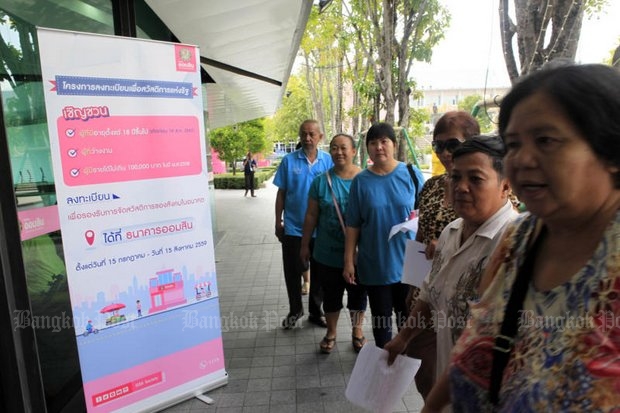
The Prayut Chan-o-cha government's decision to give New Year handouts, totalling 12.8 billion baht, to low-income people has triggered a huge debate. Many have branded the subsidy, a one-time giveaway, as populism that puts the regime in the same rank as politicians whom they had strongly criticised.
The latest measure was approved by the cabinet on Nov 22 to subsidise the cost of living of poor people as well as boost consumption.
Those eligible are poor people in non-farming sectors with yearly incomes not exceeding 100,000 baht, who had registered with the Finance Ministry's E-payment database. Of the total, some 2.3 million low-income earners qualify for the 1,500 baht one-time handout while some 3.1 million are eligible for 3,000 baht.
- Editorial: Long-term measures needed
Farmers, three million out of the eight million registered in the database, are excluded from the budget this time as they previously had access to other subsidies worth 6.54 billion baht.

Decharut Sukkumnoed is head of Kasetsart University's Agricultural and Resource Economics Department. He is well-known for his civic role.
In a bid to win justification for the measure, the Prayut government has wrapped the subsidy as part of the "economic stimulus package". The one-time distribution is expected at the end of this month or early next month at the latest.
Whatever it is called, the handouts have drawn ire from some critics who despise populism. Yet, some observers praise the move for having a clear target, and not giving out a blanket freebie. But that does not mean it is without concern.
Let me start with this. In principle, it's acceptable to stimulate the economy which, due to political reasons and the sluggish world market, has experienced massive slowdowns for quite some time. Besides, I think the government has made the right decision in targeting this most vulnerable group for the measure because, as the group of people at the lowest spectrum of society who are trapped in deep disparity, they deserve to have state assistance. The direct handout is far better than the previous tax rebate, which primarily benefited the middle class as a consumption-boosting measure.
Over the past 12 years, the people with the least income have not been able to make ends meet. Data collected in 2015 by the National Statistics Office showed this group of people, who live off their wages and salaries, earn 9,604 baht a month. Their expenses, at 12,163 baht, exceed their earnings by 27%.
Interestingly, food accounts for 48% or nearly half of their total expenses, followed by housing, transport and communication, which takes up 83% of their earnings altogether. This can be compared to those in the middle of the social spectrum who use only 20-23% of their total expenses for food, after transport costs which account for 25.6% of total expenses. It should be noted that other groups, particularly people with the most income, can save some 36% of their income.
Moreover, the food price index indicates a substantial rise in food costs over the past years compared to other consumer goods. This means this vulnerable group of people will be hit hard.
At the same time, it has been found that this group of people increasingly depend on state welfare and subsidy schemes, from 10.5% of their income in 2002 to 19.9% and 21.2% in 2011 and 2015 respectively. More importantly, since the new constitution stipulates a cut-off in education subsidy especially for those at vocational level, it means a higher burden on this group of people.
While the increase in daily minimum wages, by 5-10 baht in 69 provinces, may offer hope to some labourers, the fact is the hikes -- which are almost at the same rate as inflation -- may not be very helpful to them.
As earlier mentioned, as the people at the lowest level of the social spectrum, this less privileged group deserves state assistance and the measure in the form of direct handouts can ease their plight and, at the same time, help boost the economy.
But we should realise that the one-time giveaway of 1,500 and 3,000 baht is just a short-lived subsidy measure that will help them for only one month. So we cannot say it is the best form of assistance.
Instead, in my opinion, the 12.8-billion-baht subsidy can be used more wisely, not just as a measure with a short-lived impact.
In particular, it would be better if the sum is spent in areas to help improve the skills of these labourers, which in return would enable them to earn more or increase their production that would also help boost their earnings.
That way, the subsidy, which is coming from taxpayers, would be sustainable and bring more meaningful change.
